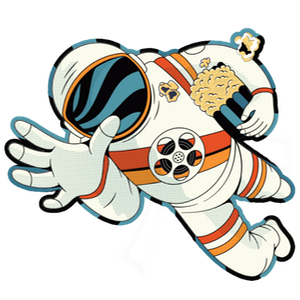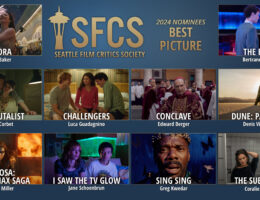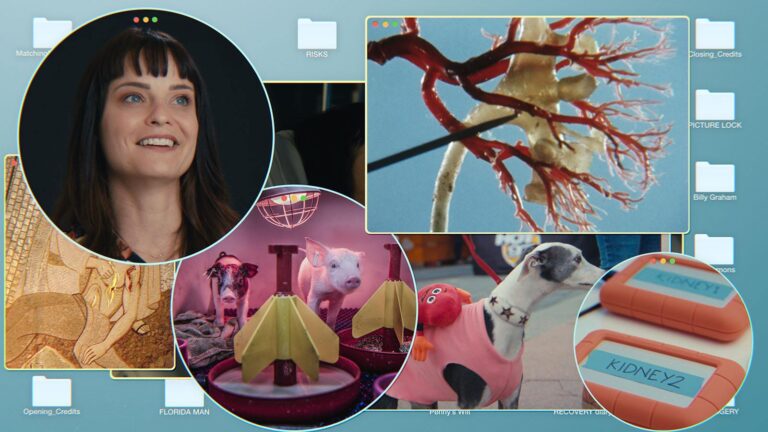I believe most writers, especially those of us who cover the arts, have a small “dream interview” list, people that we’d love to talk to, should the stars align. High on my shortlist for about a decade has been documentarian Penny Lane. She’s directed some of the most unique and memorable documentaries in recent years, full of vivid characters. Some of her most notable films include Our Nixon, Nuts!, Hail Satan?, and Listening to Kenny G. She’s like a Gen X Errol Morris and she’s amazing.
Her newest movie is her most personal, it’s called Confessions of a Good Samaritan and it plays this week at the Seattle International Film Festival. Unlike her previous documentaries, she’s the subject and she explores her decision to become an altruistic, or non-directed, kidney donor. Brian Tallerico of rogerebert.com said it was his favorite documentary of SXSW (where it premiered in March) and it’s 100% my favorite doc at SIFF.
I’ve been anxious to watch this movie since I heard Penny Lane on one of my favorite podcasts in 2021 talking about the controversial and mega-viral “Who Is the Bad Art Friend?” article in the New York Times Magazine, about two Boston-based authors, one was also an altruistic kidney donor and the other mocked the first behind her back and plagiarized an emotional letter the donor wrote to the anonymous recipient of her kidney. I thought there was a clear hero and villain but a bunch of prominent writers on Twitter weirdly took the opposite stance.
Needless to say, we had a lot to talk about.
Chris: The first thing I wanted to ask you was why you decided to make yourself the subject of this documentary when you’re usually profiling other people, or entities, like Nixon, Kenny G, and the Church of Satan?
Penny: Well, there’s a few things that kind of came together. One was that I was doing this donation and I found it very interesting, and really opening up into all these different topics that I thought were so interesting and important artistically and intellectually and spiritually; that seemed worth pursuing. At that point, I could have said, “Well, I’ll make a film about altruistic donors, but I won’t be in it.”
Right. I could have made that decision, but I knew it kind of had to be me, because I knew I really wanted to interrogate the donor. I wanted to really, really question the actions and the motivations and try really hard to really question and really interrogate the donor. And I just wouldn’t have done that to anyone else. I just would never have put someone else through the kind of intense questioning that I put myself through. So it had to be me, honestly. I would never have done this to anyone else.
I love that you made yourself this subject because, like you said, you did not want to interrogate people about their motives, especially once the “Bad Art Friend” article came out. That was probably a very sensitive subject for you.
Oh, yeah. I had many emergency therapy sessions, about the “Bad Art Friend.”
Oh no!
Yeah. I made my therapist read it. It felt like my film had come out and that this was the response. Do you know what I mean? That wasn’t logical, but I felt like I was Dawn Dorland and this is how the world saw me. And I was just angry and also humiliated at the same time. And I actually just started thinking about the “Bad Art Friend” thing again recently because it came up in a couple reviews. And I’m just angry and upset all over again about it. So the discourse never dies.
That entire situation was so fascinating and alarming to me. I was taken aback by how many prominent writers were declaring that there was a good person and a bad person, and the good person was the plagiarist who spoke behind the other’s back and the bad person was the kidney donor who saved a stranger’s life.
It was a classic example of what was once called blue check Twitter. And I was sort of reacting to what Roxane Gay was saying. I was reacting to what it seemed like this clique of important people and how they all had the same reaction, which was to mock Dawn and take Sonya (Larson)’s side. And this is kind of derailing our conversation, really, probably. But really, if you looked at the average comment section or something, most sane normal people were like, “Wait, what? This is one person gave a kidney to save someone’s life and someone else was an asshole about it. And there’s a debate about whose side we’re on?” So most people had that reaction. It was really only the kind of literary elite that was so bizarre in their take on that. And it just kind of laid bare a lot of things. Anyway, I think I probably overreacted.
Oh. No. I think I probably had the same feeling though. And I didn’t go through with this, but I just thought, wow. And this is just going to discourage people from going through with this.
Yeah. It’s not good to feel like you’re going to be mocked for being a narcissist when doing the hardest, biggest sacrifice of your life for a stranger that you don’t even know. It’s not easy to then add on top of that, the fact… The certainty that many people will interpret your actions as those of a narcissist looking for attention. And the irony with all of that is that I post on social media all the time, so I can say for certain that me posting about giving a kidney to a stranger gets 10 likes, but if I post I got a Guggenheim Fellowship, that gets a thousand likes. So in reality, people love it when you brag about professional accomplishments, but they really just don’t like it when you talk about doing good things. People just don’t… They don’t like it. So if it was a kind of play for attention, it’s a really ill-advised one, because people don’t actually give you that much attention for doing good things.
Absolutely. And I’ll get off the topic of the Bad Art Friend and hopefully not return to it. But I’m wondering, what did you learn about organ donation from when you started making the documentary that you knew beforehand?
A lot of things. But I would say the biggest thing is just how recent pf a development it is. It’s really only been a medical possibility for a half century or a little more than a half century. And over the course of that time, our kind of commonly held common sense ethical views about it have changed dramatically from decades to decades. That was the biggest thing that I thought was interesting and worth exploring in the film was… We think today, “Oh, these good Samaritan donors are freaks. There must be something wrong with them. Why would anyone do this? It’s so strange. Should we even allow people to do this? It seems wrong.” But we had the same attitude about twin brothers 60 years ago or a mother and her son 50 years ago or a sister or a friend.
So it’s just fascinating to see how our ethical ideas about this have changed. And at each stage we assume that our ethical ideas are solid and unchanging but they’ve changed a huge amount in a really short period of time.
Absolutely. I was really surprised watching it about how there were ethicists from not super long ago that were saying, “I think it’s immoral to do this for a stranger.”
Not just for a stranger, period. I mean, we shouldn’t allow someone healthy to go under the knife. It violates the Hippocratic oath. We’re doing harm to a healthy person and for no benefit to themselves in any obvious way. So yeah. It definitely is surprising, but also not, if you think about it. That’s how technological change happens. The advances occur and then everyone rings their hands about them for a while.
I was also wondering also, were there times when you were going through and making this movie about yourself and being like, “Okay, I need to stop. This is not a good idea or I need to back out.” I was so glad you made it.
I was wondering also, were there times when you were going through and making this movie about yourself and being like, “Okay, I need to stop. This is not a good idea or I need to back out.” Or did you just full speed ahead all throughout? Because I was so glad you made it, but I can’t imagine it was easy to go through.
No, it was not easy. It took me a while to decide to do it, but once I did, I was pretty committed. It really was pretty similar to the donation itself in that way. It didn’t really feel like that much of a choice. It just felt like, “I’m doing this.” And so whether I enjoy it or not is beside the point like, “I’m doing this now.” It felt kind of a calling. But yeah. It was definitely the hardest film I’ve ever made. I think that there were many challenges in the film that are inherent to it. One is making myself the protagonist and thereby conflating all that distance between director and subject, which is extremely challenging. It makes the entire process just a lot harder and slower because you have no perspective at any point in the process on your main character. And then another issue was that even just… I knew from the beginning the basic kind of character journey would be really kind of subtle and pretty weird.
The story of the recipient would make more sense to film because you have someone who is in need of something and goes out in search of it and gets it and then they’re better. And that’s a really satisfying arc. But the story of the altruistic donor is someone who is fine and then introduces this complication into their life at their own initiation. And then it is fine at the end too. And maybe worse off, maybe better off. Hard to say. So before, of course, when we started filming, I didn’t know what the end would be per se, but I did have a sense that there were challenges in making the donor the center of the story. The recipient story is a much more natural subject for a film.
Another thing I really appreciated about this being from your point of view was that there were some unpleasant parts of the surgery that you were able to show that a different subject might not have consented to. I had to laugh when you said your kidney looked like it was in a plastic bag.
Yeah. It was very gross.
I know this movie premiered at SXSW a couple of months ago. What has been the reaction you’ve gotten so far?
I mean, it’s been great. I never expected it would be a blockbuster in some sense. I didn’t ever think, “Oh, this will just draw people out of their homes and into the theaters, great numbers, the next Marvel movie would.” So I’ve been really pleasantly surprised with the audience turnouts, but also really satisfied and grateful for the responses that I’ve heard, because it’s been really fun and interesting to talk to people at the film. I think people relate to it in all kinds of ways that I didn’t necessarily anticipate. I’ve had people talk to me about their experiences being an egg donor or a sperm donor or a surrogate. And those are all, I think, really interesting parallels to make to the experience of being a living organ donor.
There’s an odd intersection of altruism, self-interest, and there’s financial repercussions. Those are, of course, all things people get paid for pretty well. So that’s an interesting difference from being an organ donor where the average donor is out four to $5,000 and lost wages and childcare and stuff like that. So it’s interesting to hear different people’s reactions and how they relate to it from their own point of view. It’s been really interesting and great, gratifying.
Have you noticed a change from before and after the surgery? You talked about there being no benefit to the donor per se. But I’m wondering if it has really altered your life since then?
It really hasn’t changed my life at all. But I would say on some very subtle psychological level, I feel like it’s not just the donation, but a couple other things that I’ve done in the last, let’s say 10 years, have changed how I think about myself a little bit. I never would’ve thought of myself as a particularly empathetic or altruistic person. It’s not… And from what I’ve learned from Abigail Marsh, the psychologist who studies extreme altruists, that’s pretty common for altruists to say. No altruist thinks they’re very altruistic or thinks they’re very empathetic. And I truly have never would’ve thought of myself in that department, in that category. But when I look at the facts of my life, I have to acknowledge… I mean, must be. I just must be. There’s no other explanation for the fact that I thought giving a kidney to a stranger was not only a good idea, but worth doing and obvious and logical and a no-brainer on some level.
There is an element that’s more like some people are just too scared of surgery or some people think of their kidney as being morally important, the integrity of their body as being more morally important, perhaps than I had thought. But mostly I just think I must be a pretty generous person, which just feels weird to say, because I don’t believe that. But I’m sort of confronted with some facts that have forced me to shift my view of myself a little bit. So I think that that has changed to some extent. But it’s pretty subtle. Other than that, my life’s exactly the same and it doesn’t get me off the hook. I don’t think, “Well, I did that. So now I can just be a bitch to everybody forever.” I don’t feel like I’ve racked up any karmic points that I get to squander. It’s kind of the same life.
One thing I thought of while watching your movie was about altruists profiled in the book, I think it was called, Drowning Strangers, by Larissa MacFarquhar.
Yeah, Strangers Drowning.
Right. I remember a scene about a woman whose husband or boyfriend bought her an ice cream treat for a couple of dollars…
It’s the other way around. But I know exactly what you’re talking about. She bought the ice cream treat and her boyfriend was like, “We could have saved a life with that money.”
Yes! I think that was way too intense for me because I couldn’t imagine how a life so devoted to selflessness like that would compute with me. But I do think there’s something uniquely generous about what you’re doing by donating a kidney to someone you don’t know. I think that’s something we need to really encourage more and more and more people to be doing.
Yeah. I think so too. But just to get back to that idea that people do not like altruists. There’s something called do-gooder derogation, where in many studies it has been shown over and over again that people will absolutely find any way they can to tear down a person who they perceive as being morally virtuous. Most people are familiar with this from their encounters with vegans. And so as a person who is a vegan, I would say the most similar thing in my life to telling people that I’m an altruistic kidney donor is telling people that I’m vegan. That people have a very wide range of reactions. Most of which are extremely defensive and angry. And it’s so weird. People are just like, “Oh, why are vegans like this?” And I’m just, “They’re not really.”
And I know that because I used to not be vegan and I had the same eye rolling at the vegan thing. There’s something about someone who walks the walk, who does really tries to be morally virtuous, that is just really uncomfortable for the rest of us normal people to deal with. So I don’t think of myself as being particularly morally righteous, but I know that some things that I’ve chosen to do in my life that do entail sacrifice, make people angry, actually angry. Not everybody, but there’s… That’s part of the normal range of reactions is anger and suspicion that there’s something that you’re covering up for or… What did you do? What have you done before that you feel like you have to do this to feel like a good person?
I kind of get that impulse, but also I also kind of feel like… Well, I’m not the one out here walking the walk. So, hats off to you for doing that.
I’m excited that Confessions of a Good Samaritan is playing at SIFF this year because I really want a lot of people to see it, but can you talk about what is going to happen with this movie after its screenings are over?
I wish I could be there. We don’t know. It’s still without distribution. So it’s playing the festival circuit for the time being.
Is there something you want people to take away from it that we hadn’t talked about?
I try to make films in a way where there isn’t a takeaway that I want people to get. If there was, I would just write a tweet, really simple. But I try to think of it as a smorgasbord, a huge table piled with amazing treats for you to pick up at will and take with you and go wherever. So for some people, this film is really about this specific question of altruistic kidney donation and whether I should consider it. And so people believe and spend a lot of time thinking about that. For other people, it’s really more philosophical. It’s sort of this question of, “How do you know if you’re an altruistic person, what is altruism? Where does self-interest play into it?” That’s such an endlessly interesting philosophical debate that I think a lot of people pick up and go from there. There are people who I think will find the formal aspects of the film interesting to think about and dissect and why is the music this way and why is it so psychedelic? And some sections and things like that.
So there isn’t really a takeaway, but I do think that there’s a lot there for anyone to take what they think is interesting from it and keep talking about it. My goal is always to make movies where you go see the film with your friend and then you find yourself talking about the film with your friend for longer than the runtime of the movie. I think there’s ample things to get into and places to go. So that’s my hope that people will take that as an invitation. Definitely not trying to convince anybody to do anything. That’s not my personality type at all. I’m quite “live and let live.” I think people should more or less be free to make their own choices. And I also just, I’m not an activist and so if I was trying to make a PSA for organ donation, I think I failed. It’s probably not a very good PSA but I hope that it’s a bit of a challenge to people as well, in one way or another.
Oh, absolutely. And I actually do think that this is at least something of a PSA, because you interview someone who says that we can eliminate the kidney donor waiting list if 10,000 agree to become donors. I think that was a very important point that your movie got across.
An okay PSA.
[Actual PSA: People interested in exploring becoming a kidney donor can click here.]
Confessions of a Good Samaritan plays at SIFF on Wednesday, May 17 at SIFF Cinema Uptown at 6:00 PM and on Thursday, May 18 at Pacific Place at 3:30 PM.

The Seattle International Film Festival runs from May 11-21 in person and May 22-28 online. Keep up with our reactions on Twitter (@thesunbreak) and follow all of our ongoing coverage via our SIFF 2023 posts




